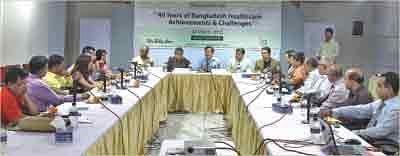Call for improved primary medicare

The Daily Star and Health Prior 21 jointly organised a roundtable, “40 Years of Bangladesh Healthcare: Achievements and Challenges”, at The Daily Star Centre in the city yesterday.Photo: STAR
Forty years into independence, the country's health sector has introduced new ideas, but gross inequity has left the poor out of quality health services, experts say.
Over the years, successive governments have embraced essential healthcare packages, moving away from the concept of primary healthcare that involves reducing social disparities in health.
They also say better healthcare governance along with ethical practices is crucial for the overall improvement of the sector.
Their comments came at the roundtable, “40 Years of Bangladesh Healthcare: Achievements and Challenges”, jointly organised by The Daily Star and Health Prior 21 yesterday.
Health experts from home and abroad attended the event held at the Daily Star Centre in the capital.
Bangladesh has launched several innovative schemes and presented low-cost life-saving solutions to the rest of the world, they said.
ORS (oral rehydration solution), DOTS (directly observed treatment, short-course), community-based health and family planning services, Population Policy, 1976, National Drug Policy, 1982 and Sector Wide Approach (SWAp) are some of those milestones.
However, nutritional status, especially the extent of wasting, has remained almost static in the last four decades, they said.
People should be empowered to oversee the primary health status of their own community and take appropriate measures, said Rubaiul Morshed, chairman of Health Prior 21.
“Health is not mainly an issue of doctors, nurses and health administrators… it is an issue of social justice.”
“Even within the existing resource constraints, a lot can be done for our health system by creating public awareness, setting the right priorities and promoting incentives and behavioural norms among medical practitioners”, Rubaiul said.
Presenting a paper, Khairul Islam, country director of WaterAid, suggested drug policy reforms.
Omar Rahman, vice-chancellor of Independent University, said, “We must ensure access and quality.”
Syed Jahangir Haider, executive director of READ, said there had been no change in the budget pro-forma for the last three decades. “We have no pro-forma for urban health and upcoming issues in the budget.”
He added the government should give incentives to service providers.
Raihan Chowdhury, managing director of Cardiac Anaesthetist, said our basic life support protocol is not well enough and sometimes makes issues complicated and beyond cure.
Farhana Rahman, vice-chairperson, BASIS, said the sector was least interested in ICT facilities which had tremendous potentialities to decentralise healthcare.
Timothy Lee, a doctor at Singapore Mount Elizabeth Hospital, said healthcare system should be carefully regulated so that access and quality could be ensured.
Amirul Hossain Chowdhury, a doctor at Bogra Medical College, said ethical practice both by service providers and consumers should be improved. “There is a body in BMDC to look after ethical practices but the body is completely ineffective.”
Prof Saiful Islam of Bangabandhu Sheikh Mujib Medical University noted that half of children in Bangladesh lacked proper nutrition. “We have tackled bird flu, shown our capacity, but failed to address food adulteration.”
”We need health care governance,” he said, adding it should be beyond grouping and narrow politics.
CMM Hasan, a US-based cardiologist, said rating of health service providers and professionals could be a good solution toward making health services more consumer-friendly.
“School curricula should include basic healthcare practices.”
Towfique Islam, senior consultant to several private hospitals in Singapore, said Global Doctors' Forum, a platform for non-resident Bangladeshi doctors, planned to set up several centres of excellence for different medical specialties in Bangladesh to assist and share global knowledge with local talents on meritocracy basis.
Mahbubur Rahman, a cardiologist at Labaid Hospital, said media should make the people aware of basic healthcare services and inspire them to demand proper treatment as a basic right.
Brig Gen (retd) Shahedul Anam Khan, editor of op-ed and defence and strategic affairs at The Daily Star, said the English daily was very eager to partner with well-timed initiatives and would do its best to create awareness among the people.
Aporna Ghosh, doctor, Apollo Hospital; ABM Haroon, doctor, Samorita Hospital; Prof Habibul Haque of Northern University, Atsuko Kishida, nurse instructor at BSMMU, and Sohrab Hossain, doctor at CRP, also spoke on the occasion.

 For all latest news, follow The Daily Star's Google News channel.
For all latest news, follow The Daily Star's Google News channel. 



Comments